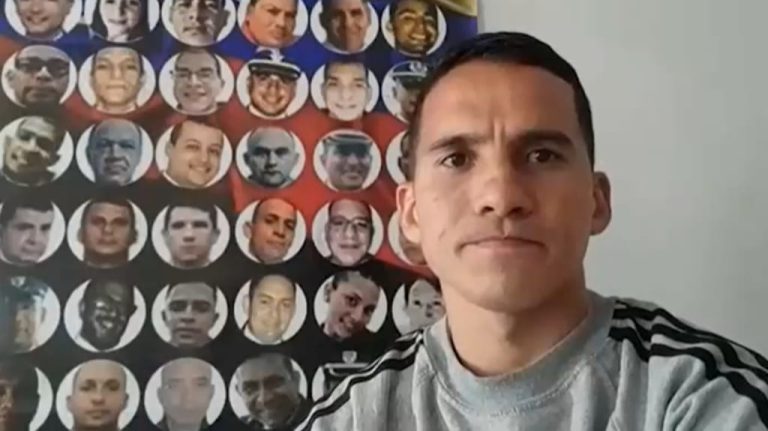29 de febrero 2024

European Concern over Lack of Academic Freedom in Nicaragua

PUBLICIDAD 1M
PUBLICIDAD 4D
PUBLICIDAD 5D
The kidnapping of Lieutenant Colonel Ronald Ojeda violates Chilean sovereignty in an unjustified and unprovoked aggression

Lieutenant Colonel Ronald Ojeda, Venezuelan military.
Last week I wrote about Navalny’s second murder. “Second” because the previous one, attempted poisoning, was overcome in a Berlin clinic. This one occurred in prison, without an official explanation of the cause, without an autopsy.
I drew a parallel with other deaths in State custody in Latin America; according to authorities, due to various natural causes. Whether due to delicate health, covid-19, accidents, or suicide, purportedly, that is the standard argument in Cuba, Nicaragua, and Venezuela. The number of these episodes is directly correlated with the time these dictatorships have been in power. Today I return to the subject, including another crime on the list: a kidnapping, moreover, in a foreign nation.
This happened in the case of Lieutenant Colonel Ronald Ojeda, a Venezuelan officer who previously escaped from a prison in his country and with refugee status in Chile. He is seen in the security video of the building where he lives, semi-naked, in underwear, and being forcibly taken by a group of individuals self-identified as the Investigative Police of Chile, but hooded and wearing military attire, weapons, and equipment.
Given the modality of the operation, the weapons, gestures, and capture techniques observed, experts believe it was a commando of the Military Counterintelligence of Venezuela. The alternative hypothesis suggests an operation carried out by organized crime. They speak of the “Aragua Train”, an organization with a presence throughout the region, including Chile.
But it’s the same thing, I add. The Chavista regime [of Hugo Chavez and then Nicolas Maduro] has always relied on non-state parallel organizations, motorized collectives, paramilitaries, criminal gangs in prisons, or organized crime. It operates in collusion with them and with different degrees of integration. The links between them are not accidental, they are organic. It is the fusion of state violence, territorial control, and the extraordinary resources that originate in drug and human trafficking, illegal mining, and gasoline smuggling.
This kidnapping is of greater sophistication. It includes a violation of sovereignty and various instruments of international law on asylum, starting with the Universal Declaration of Human Rights of 1948 and the 1951 Refugee Convention. The infiltration of military personnel into foreign territory, impersonating Chilean police to carry out a kidnapping and subsequent disappearance once there, also constitutes an act of unjustified and unprovoked aggression against another nation.
That is precisely what it is about. Diosdado Cabello’s irony in his usual television parody denying Caracas’ involvement in the kidnapping is nothing more than the regime’s signature at the bottom of the page. Precisely, the dictatorship always presents itself with exhibitionism. Thus, in passing, it humiliates the Government of Gabriel Boric, leftist but critical of the Maduro dictatorship, a reproach that hurts them.
With this operation, Maduro also humiliates the United States, no less, reducing its international stature. The Biden Administration invested a great deal of foreign policy resources in a transition process led by the Maduro regime. To this end, it pardoned Alex Saab, lifted sanctions, and sponsored the signing of gas exploration contracts in the Caribbean operated by PDVSA. This would accelerate the negotiation process in Barbados with free and fair elections later this year.
A negotiation process that hit a dead end. With Saab free and fewer sanctions, the regime embarked on a fierce repression spree. It ratified the disqualification of María Corina Machado as a candidate, imprisoned several of her close collaborators, pursued journalists and human rights defenders, and produced the disappearance, then arrest, of Rocío San Miguel, taking her family hostage.
And now this kidnapping, with which he also humiliates the Chilean security forces. No one talks about transition and elections anymore, as if they were part of a distant past. Now the elephant is in the room. It’s that while they were talking about elections, Maduro was preparing to capitalize on the upcoming international situation: the elections in the United States.
He knows well that no one will be paying too much attention as November approaches. And it’s the third time, he did the same in 2016 and 2020. All governments change, but Chavismo remains.
*Article originally published in Infobae
This article was published in Spanish in Confidencial and translated by Havana Times. To get the most relevant news from our English coverage delivered straight to your inbox, subscribe to The Dispatch.
PUBLICIDAD 3M
Académico argentino. Actualmente es profesor en el Centro de Estudios Latinoamericanos en la Universidad de Georgetown. Es autor de varios libros y articulista de opinión en diferentes medios.
PUBLICIDAD 3D